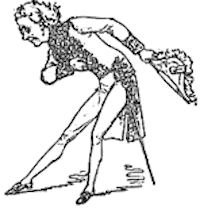The phrase ‘break a leg’ is a jovial encouragement, said to actors for good luck before they go on stage, especially on an opening night.
Break a leg
What's the meaning of the phrase 'Break a leg'?
What's the origin of the phrase 'Break a leg'?
Theatrical types are well known for their belief in superstitions, or at least for their willingness to make a show of pretending to believe in them. The term ‘break a leg’ appears to come from the belief that one ought not to utter the words ‘good luck’ to an actor.
By wishing someone bad luck, it is supposed that the opposite will occur. Other superstitions are that it is bad luck to whistle in a theatre, to say the final line of a play during dress rehearsal, or to say the name of ‘the Scottish Play’ (Macbeth) in a theatre’s green room.
The word ‘break’ has many meanings – the OED lists 57 distinct uses of it as a verb alone. That gives considerable scope for speculation over what is meant by this phrase. The most common interpretation of ‘break’ in this context is ‘to deviate from a straight line’, as in the cricketing term ‘off break’, to unstraighten the leg by bending at the knee, by bowing or curtsying.
‘Break a leg’ also means ‘make a strenuous effort’. There are many references to the phrase used that way, which pre-date the earliest theatrical good luck charm meaning; for example, from The Hammond Times, Indiana, 1942:
“Whatever the army or navy want, the Continental Roll [and Steel Foundry] will turn out … Or break a leg trying.”
and from the Evening State Journal, Nebraska, 1937:
“With all the break-a-leg dancing there are many who still warm to graceful soft shoe stepping.”
So it is possible that when an actor is told to ‘break a leg’, he/she may just be being exhorted to put on an energetic, exciting performance.
There are many other possible derivations in circulation, mostly referring to the ‘good luck’ message. In diminishing order of plausibility, these are:
- Put on a performance good enough that you will have to bend your knee in a bow or curtsy to acknowledge the applause.
- Impress the audience so much that you will need to bend down to pick up the coins they throw onto the stage.
- Pass out onto the stage to receive a curtain call (the side curtains on a stage are known as legs).
- Evoke the powers of the celebrated actress Sarah Bernhardt, who had one leg.
- A reference to John Wilkes Booth, who broke his leg when jumping on stage, attempting to flee after shooting President Lincoln.
It is tempting to believe the phrase to be ancient and to imagine it whispered to Tudor minstrels as they went on stage at Shakespeare’s Globe Theatre. There was an earlier meaning of ‘break a leg’ of that vintage (1670), which was ‘to give birth to a bastard’. This is now entirely out of use and is not related to the theatrical version. The current meaning is nothing like as old. The term originates in the American theatre in the 20th century and all the earliest references to its use are from US sources.
The earliest citation I can find in print of ‘break a leg’ in the theatrical sense is from as late as 1948, from an edition of the US newspaper The Charleston Gazette in May of that year. This is from their ‘Ask The Gazette’ column:
Q. What are some of the well-known superstitions of the theatre?
A. Superstitions of the stage are numerous and many are particular to individual actors and actresses. That it is bad luck to whistle in a dressing room is a widely accepted belief. Another is that one actor should not wish another good luck before a performance but say instead ‘I hope you break a leg.’
That pretty much rules out the Sarah Bernhardt and John Wilkes Booth interpretations which, as well as being rather fanciful, date from too far before any printed version.
There is a German saying ‘Hals und Beinbruch’, meaning ‘break your neck and leg’, which dates back to at least WWII as Luftwaffe slang, and is therefore earlier than any known English version. It may be that this is a corruption of the Hebrew blessing ‘hatzlakha u-brakha’, meaning ‘success and blessing’.
German and Yiddish were commonly used languages of the large Jewish contingent of the US theatre world. We can’t be certain of the origin of the phrase, but it’s highly likely to have migrated to English from the earlier German and Hebrew versions.
See other phrases that were coined in the USA.
The history of “Break a leg” in printed materials
Trend of break a leg in printed material over time
Related articles
Related phrases and meanings
Browse more Phrases
About the Author

Phrases & Meanings
A-Z
A B C D E F G H I J K L M N O P Q R S T UV W XYZ
Categories
American Animals Australian Bible Body Colour Conflict Death Devil Dogs Emotions Euphemism Family Fashion Food French Horses ‘Jack’ Luck Money Military Music Names Nature Nautical Numbers Politics Religion Shakespeare Stupidity Entertainment Weather Women Work
How did we do?
Have you spotted something that needs updated on this page? We review all feedback we receive to ensure that we provide the most accurate and up to date information on phrases.
